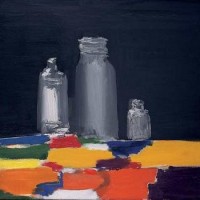6 Poets in Subtropics

Subtropics is published twice year by Subtropics, Department of English at the University of Florida. It’s the official literary magazine of the University of Florida, and, though only founded in 2006, has published both notable writers and poems selected for Best American Poetry and the Pushcart Prize Anthology.
All the pieces I’ve selected are straightforward, refreshingly original and reasonably successful. The first is Diane Schenker’s Epithalamium, which can be read here: http://www.english.ufl.edu/subtropics/Schenker_poem.html
Epithalmium means ‘at the bridal chamber’, i.e. wedding song, of course, but here the second half the word is taken to be ‘thamalus’, i.e. a part of the brain or the receptacle of a flower. The poem starts:
Heap round the inner chamber with sweet-
Smelling flowers, lay out wine and delectables,
Fresh sets of sheets. Blow horns!
Welcome the two ovoid masses
That the sensory stimuli may be relayed
And then, a few lines later, switches to the botanical sense:
Enter bride! Enter groom!
Stamen, pollen-producing filament and anther
And so on: an extended literary conceit carried off with considerable aplomb.
The unexpected is also seen in Jake Adam York’s Epistrophy at: http://www.english.ufl.edu/subtropics/York_poem.html
The poem has echoes of Auden’s As I Walked Out One Evening, but is otherwise very different. It opens with:
The sleeve sighs from the jacket,
The record from the sleeve.
The needles takes its breath.
Epistrophy (to save a Wikipedia search) is a jazz standard composed by Thelonious Monk and Kenny Clarke in 1942, and indeed Monk appears throughout the poem, not in a technical guise but as a memory of the writer’s father, who used to play such records. The poem ends:
Then
the room is young again,
the smoke, the silence, the stars,
years away, until dusk
raises it hands from the keys.
Then the needle gasps,
and I stand. I reach,
his hand on mine,
and breathe again.
Pamela Alexander’s Thus Quoth (http://www.english.ufl.edu/subtropics/Alexander_poem.html) has the charm of a Mother Goose tale but with a dash of mystery. It’s too short to quote extensively: three lines:
I can be blue, the blue fox said.
Get over yourself, said the moon.
What are fences? Asked the moon.
That pleasing air of the improbable is also seen in K. Edwards’ High Times at:
http://www.english.ufl.edu/subtropics/Edwards_poem.html. I quote the first and last stanzas to show how poetry can be made out of the most unprepossessing material:
The skating rink thawed and the factory closed.
Insecticide killed off the last signs of life.
We rolled up the grass and grandmother’s clothes
When anywhere else was a Saturday night.
When anywhere else was a Saturday night,
We took off our clothes and we bathed in champagne.
Our skin turned the shade of daguerreotypes
As we circled and circled and circled the drain.
David Huddle’s Beautiful Aunt (http://www.english.ufl.edu/subtropics/Huddle_poem.html) lacks the assured rhythm of the previous piece but has the writer’s gift for choosing the right word, unexpected but then satisfying. The poem hasn’t wholly detached itself from prose, and is probably too long for what it has to say, but the first stanza opens magnificently:
Our beautiful aunt Constance rejected
Suitors almost recreationally,
Spoke with flamboyance, and behaved
with such charming peculiarity.
Saara Myrene Raappana’s Winter Correspondence (
http://www.english.ufl.edu/subtropics/Raappana_poem.html) brings the Greek myths up to date. Fourteen lines rhymed ax ax bx bx etc., where x is the word ‘snow’ make up the Demeter to Persephone sequence, and also (largely) the Persephone to Demeter rejoinder. Otherwise there is very little traditional about the poem, as the opening couplet suggests:
You pulled that man up like a root-snake-limbed, sulfuric, old
-and followed him down south, foolish as a thresher tilling snow.
The opening couplet from the Persephone to Demeter rejoinder is equally up to date:
Your e-mail says you’ve chilled the tussock sedge, taught it not to grow,
that the bowsaw of you, Mother, carves angels from hard-packed snow.
Like its imagery, the message is chilling, quotidian and uncompromising:
Your lines are down. They died in drifts of snow.
